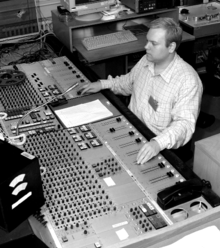
An audio engineer (also known as a sound engineer or recording engineer)[1][2] helps to produce a recording or a live performance, balancing and adjusting sound sources using equalization, dynamics processing and audio effects, mixing, reproduction, and reinforcement of sound. Audio engineers work on the "technical aspect of recording—the placing of microphones, pre-amp knobs, the setting of levels. The physical recording of any project is done by an engineer…"[3]
Sound engineering is increasingly viewed as a creative profession and art form, where musical instruments and technology are used to produce sound for film, radio, television, music and video games.[4] Audio engineers also set up, sound check and do live sound mixing using a mixing console and a sound reinforcement system for music concerts, theatre, sports games and corporate events.
Alternatively, audio engineer can refer to a scientist or professional engineer who holds an engineering degree and who designs, develops and builds audio or musical technology working under terms such as electronic/electrical engineering or (musical) signal processing.[5]
- ^ "Which Type Of Sound Engineer Are You Destined To Be?". www.sheffieldav.com. Retrieved 2019-02-05.
- ^ The difference between a producer and an audio engineer, 10 October 2013, archived from the original on 2021-12-15, retrieved 2019-12-08
- ^ "Interview with Phil Ek". HitQuarters. 25 May 2009. Archived from the original on 19 July 2011. Retrieved Sep 3, 2010.
- ^ Rosenberg McKay, Dawn. "Audio Engineer Job Description: Salary, Skills, & More". About.com Careers. Archived from the original on 23 July 2018. Retrieved 8 Dec 2019.
- ^ Smith, S. E. "What Is Audio Engineering?". wiseGeek. Archived from the original on 8 January 2010. Retrieved 17 May 2013.